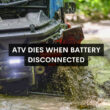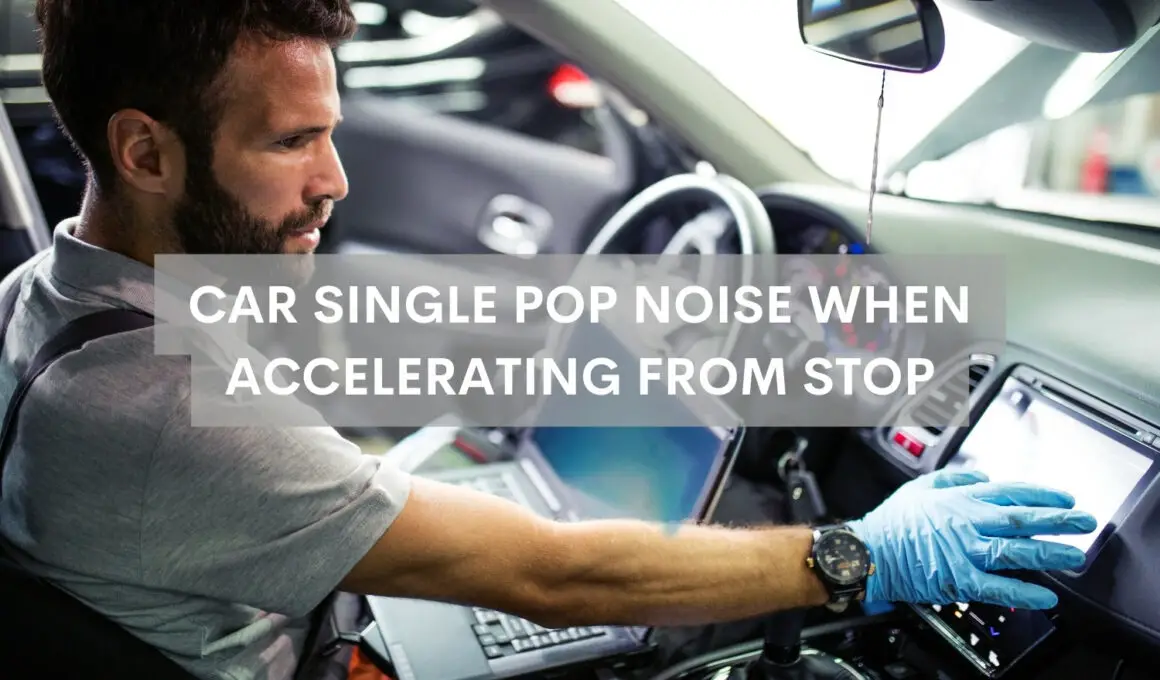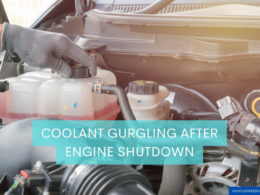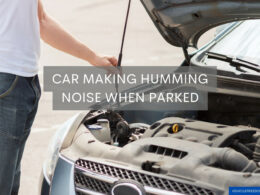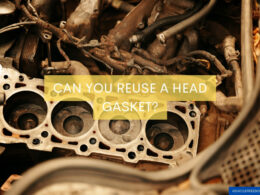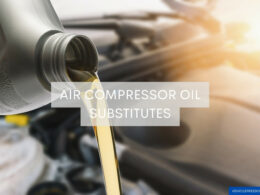In This Article Show
I’ve heard my fair share of peculiar car noises and I’ve written about most of them more than I can count here on VehicleFreedom.com. For example there’s AC compressor noise at Idle, car whirring sound after turning off engine, your vehicle making humming noise when parked and so much more.
One that particularly stands out and prompts numerous queries is the distinctive “pop” sound when accelerating from a stop. It’s a sound that can cause panic, a flurry of questions, or sometimes, just mild annoyance.
But what causes this sound? And more importantly, how can it be fixed?
In this article, I’ll use my years of experience from under the hood and behind the keyboard to unravel this problem. Whether you’re a seasoned car lover or just someone looking to learn more about your vehicle’s odd noise, you’ve come to the right place.
Why Car Noises Matter
Over my 13 years as a mechanic, I’ve seen many car owners who dismiss unusual car sounds as just “quirks” of their vehicle. However, those seemingly innocent noises can sometimes be harbingers of underlying problems.
Let’s discuss why paying attention to them is more than avoiding annoyance.
1. Early Warning Signs of Potential Issues
Cars, much like our bodies, have ways of communicating when something isn’t right. A sudden pop, a grinding noise, or even a faint rattle can all be early indications that a particular component is not operating optimally.
Addressing these sounds early can often prevent a small issue from escalating into a much costlier repair or even a total breakdown.
2. The Significance of Addressing These Noises Promptly
Time and again, I’ve encountered vehicles in my workshop where delayed attention to a noise resulted in consequential damages. A neglected sound today might lead to a compromised vehicle component tomorrow. Acting promptly ensures your car’s longevity and saves money in the long run.
3. Potential Safety Concerns
This can’t be stressed enough. Some noises signal critical malfunctions that can jeopardize the safety of the vehicle’s occupants and others on the road. For instance, a malfunctioning brake system might produce squealing noises. Ignoring such sounds can have dire consequences.
In summary, while your car’s unexpected “pop” or “click” might be momentarily dismissed, these noises carry messages. As someone who’s spent over a decade diagnosing and fixing vehicles, I assure you that tuning into your car’s “language” is essential for any vehicle owner.
It’s not just about car care; it’s about safety, longevity, and economical sense.
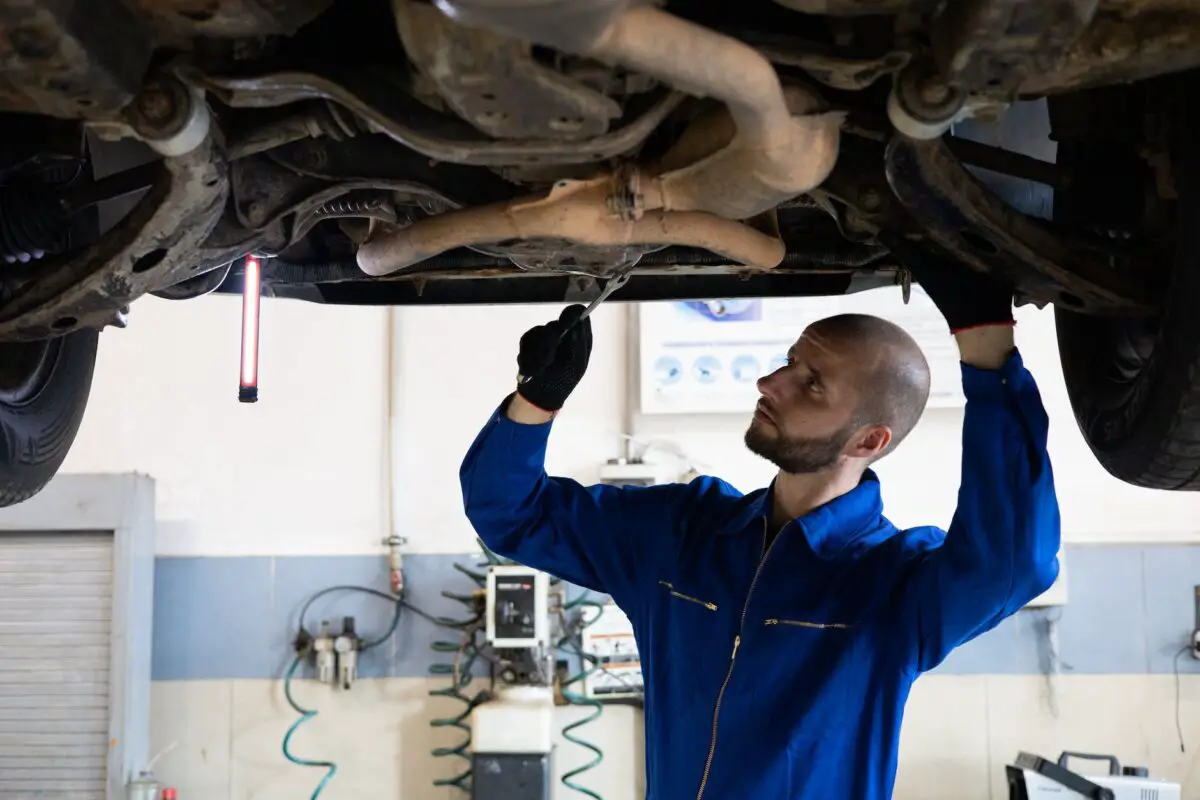
Common Causes of the Single Pop Noise
Cars are complex machines with lets say complex parts. While a sudden pop noise when accelerating from a stop can be alarming, pinpointing its source is crucial. Let’s delve into some of the most common culprits behind this perplexing sound:
1. Engine Backfire
Explanation and reasons behind it
A backfire occurs when incomplete combustion leads to a mixture of air and fuel igniting somewhere other than the combustion chamber. This can happen in the intake or the exhaust.
How it manifests as a pop noise
The ignition of this air-fuel mixture produces a sharp “pop” or “bang”. It’s essentially the car’s way of telling you that its combustion process isn’t going as smoothly as it should.
2. Driveshaft or Axle Issues
Understanding the driveshaft/axle and its role
The driveshaft is a mechanical component that transfers torque and rotation to the car’s wheels. Conversely, the axle supports the vehicle’s weight and ensures the wheels remain in their designated position.
Causes leading to popping noises
Loose U-joints on the driveshaft or worn-out CV joints on the axle can result in intermittent popping sounds, especially when the car transitions from stationary to motion.
3. Transmission Concerns
Linking transmission and acceleration
Your car’s transmission plays a pivotal role during acceleration. It ensures the engine’s power is efficiently transferred to the wheels.
Typical problems causing the noise
If the transmission has a problem, especially with its fluid or linkage, it might produce a pop sound during the transition from stop to start. Worn out transmission mounts or bands can also be a contributing factor.
4. Suspension System Problems
How suspension can cause noise during movement
The suspension system absorbs road shocks and ensures a smooth ride. Components like springs, shock absorbers, and struts work together to achieve this.
Identifying if suspension is the culprit
If any part of the suspension system becomes worn or damaged, it can lead to popping sounds. Commonly, damaged struts or bushings are the culprits.
5. Motor Mounts
The role of motor mounts in a car
Motor mounts secure the engine to the car’s frame and absorb vibrations. They ensure the engine stays in place and doesn’t excessively vibrate during operations.
How worn or broken motor mounts lead to noises
When these mounts weaken or break, the engine might shift or knock against the frame, especially during acceleration, leading to a pop or thud sound.
Understanding the root cause of the pop noise is half the battle. Once identified, addressing it becomes a far more streamlined process.
Diagnosing The Single Pop Noise
Determining the exact origin of that single pop noise when you accelerate from a standstill can be likened to piecing together a puzzle. The sound might be fleeting, but it holds clues about your vehicle’s health.
Here’s how you can embark on the detective journey of pinpointing the cause:
1. Importance of Proper Diagnosis
While our earlier section discussed potential causes, correctly diagnosing the noise ensures that you aren’t fixing something that isn’t broken. Accurate diagnosis prevents unnecessary costs and ensures the real issue doesn’t persist or worsen.
2. DIY Methods for Pinning Down the Cause
Visual Inspection
Start with a comprehensive visual inspection of your vehicle. Sometimes, the problem, like a visibly broken motor mount or a damaged exhaust component, can be evident upon a careful look.
Recreate the Scenario
Safely reproduce the circumstances in which the noise occurs. If it’s when accelerating from a stop, find a safe spot, like an empty parking lot, to mimic the conditions. Pay close attention to when and how the noise manifests.
Sound Mapping
Try to discern where the sound is loudest. Is it coming from the front or rear? Left or right side? Pinpointing the direction can narrow down potential culprits.
Check Fluid Levels
Low or dirty fluids, especially transmission fluid, can cause various noises. Ensure all fluids are at recommended levels and appear clean.
3. When to Seek Professional Help
Persisting Noises
If you’ve attempted to diagnose the problem but the noise persists, it’s time to consult a professional. Some issues require advanced tools and expertise to pinpoint.
Safety Concerns
If you suspect the noise is related to a crucial system like brakes or steering, it’s advisable to seek professional input immediately. Your safety should always be paramount.
Complex Systems
Car components like modern transmission systems can be intricate. If you believe the issue lies here, consulting someone with specialized knowledge is best.
Pro Tip 👋
Need to talk to a professional with a special discovery on your car issue? Use this link to talk to a professional. This is in partnership with JustAnswer, which has an on-call expert who can help you, especially during an emergency. Talk to a master mechanic now.
Effective Fixes For The Single Pop Issues
Once you’ve identified the root cause of that pesky pop noise, the next step is addressing the issue. Whether you’re taking the DIY route or heading to a professional mechanic, having an understanding of potential fixes can be invaluable. Here are some solutions based on the common causes discussed earlier:
1. For Engine Backfire
Tuning and Adjustments
Sometimes, a simple tuning of the engine or adjusting the timing can rectify a backfire. It ensures that the combustion process happens as intended.
Checking and Replacing Damaged Parts
Components like the distributor cap, spark plugs, or the air-fuel mixture might need checking. If they’re worn out or malfunctioning, replacements might be in order.
2. For Driveshaft or Axle Issues
Lubrication Tips
Keeping the U-joints of the driveshaft well-lubricated can prevent several issues. If you hear the pop sound, consider checking the lubrication status.
Replacement Guidance
If the CV joints on the axle are damaged, they might need replacing. It’s a task best left to professionals, given the complexity.
3. For Transmission Concerns
Fluid Level Checks and Replacements
Ensure the transmission fluid is at the optimal level and is clean. Dirty or low fluid can lead to noises and hinder smooth transmission operation.
The Significance of Timely Servicing
Regularly servicing your transmission can prevent many potential noises. If issues like worn-out bands are diagnosed, they can be replaced during these routine checks.
4. For Suspension System Problems
Inspection and Parts Replacement
Regularly inspect suspension components like struts, bushings, and shock absorbers. If they show signs of wear or damage, consider replacements.
Ensuring Alignment and Balance
Sometimes, the vehicle’s alignment or wheel balance could be off, leading to noises. Checking and adjusting them can resolve the issue.
5. For Motor Mount Issues
How to Check for Damage
Inspect the motor mounts for any visible cracks, wear, or damage. It’s a sign they need attention if they seem compressed or degraded.
Replacement and Preventive Measures
Worn-out motor mounts should be replaced promptly. Investing in quality mounts and ensuring they’re not exposed to excessive engine heat can prolong their lifespan.
While these fixes provide a roadmap to a quieter and smoother ride, always remember: seeking professional advice is the best route when in doubt. Fixing car issues early and effectively can ensure your vehicle serves you reliably for years.
Prevention – Keeping the Pop Noise at Bay
While it’s essential to address noises once they appear, adopting certain preventive measures can keep many of them from ever arising. Let’s delve into strategies that can help you maintain a serene driving experience:
1. Regular Maintenance and Check-ups
Routine Services
Make it a point to have your car serviced at the intervals recommended by the manufacturer. Routine services often catch potential issues before they can manifest as noises or more serious problems.
Timely Oil Changes
Regularly changing your engine oil and ensuring you use the right grade is pivotal. It not only enhances engine efficiency but also prevents untimely wear and tear.
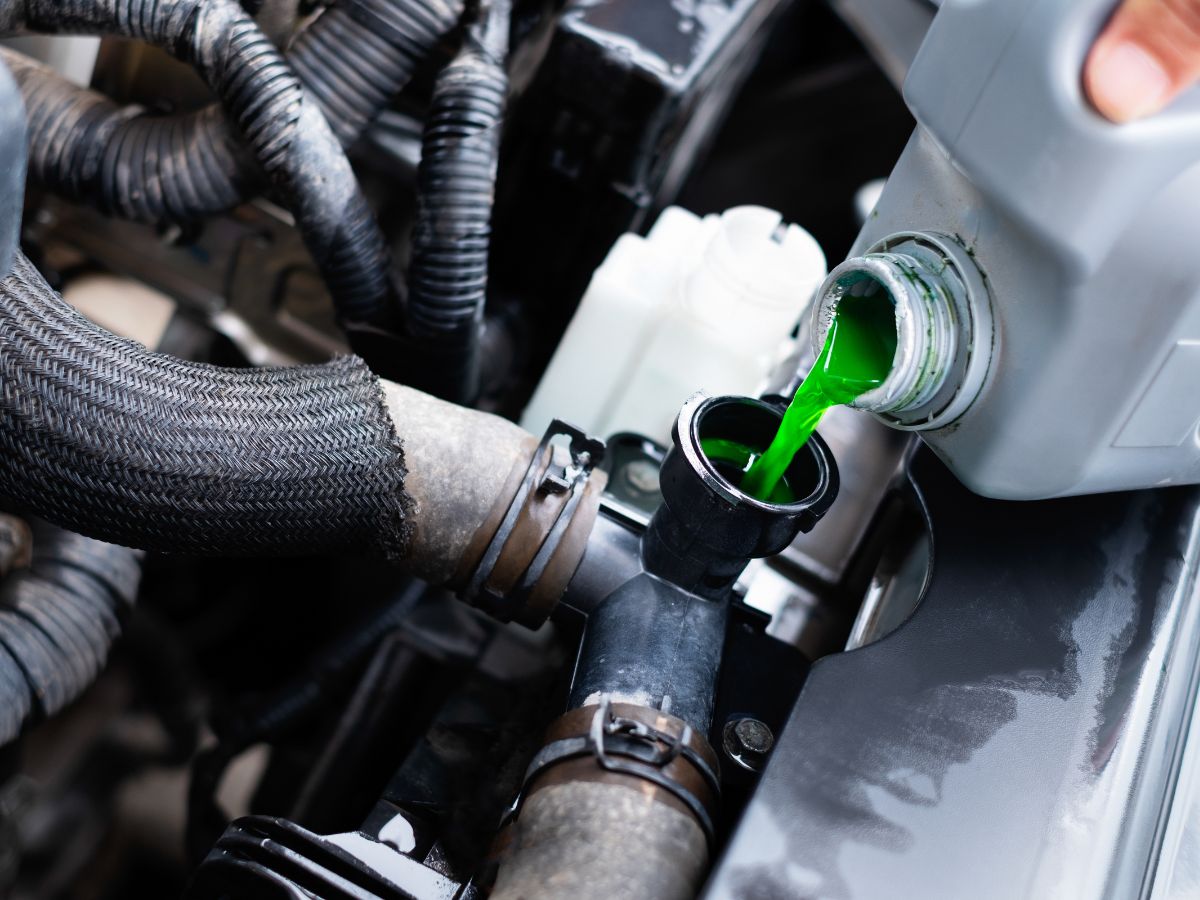
2. Monitor Fluid Levels
Transmission Fluid
Ensure your transmission fluid is always at the recommended level and replaced at specified intervals. Clean fluid ensures smooth gear shifts and minimizes wear.
Other Essential Fluids
Regularly check the levels of other fluids such as brake fluid, coolant, and power steering fluid. Maintaining optimal levels can prevent a host of issues.
3. Listen Actively to Your Vehicle
Tune in to Changes
Don’t dismiss it even if it’s a subtle change in how your car sounds or feels. These could be early indications of an impending issue.
Address Sounds Early
If you do hear an unusual noise, try to address it as soon as possible. Earlier intervention often translates to simpler and cheaper fixes.
4. Invest in Quality Parts
Quality Over Savings
It’s worth investing in quality parts when replacing any component, even if they’re slightly more expensive. They often offer better performance and longevity.
Authenticity Matters
Avoid counterfeit or sub-par parts. They might not provide the efficiency or lifespan you expect, leading to earlier failures and potential noises.
5. Avoid Harsh Driving Conditions
Drive Smoothly
Abrupt starts, sudden stops, or aggressive turns can put undue strain on your vehicle’s components. Adopt a smooth driving style to prolong your car’s health.
Mind the Terrain
Avoid them if your vehicle isn’t designed for rugged terrains. Uneven roads can strain the suspension and other components, leading to premature wear.
6. Educate Yourself
Stay Updated
With the ever-evolving world of automotive technology, staying updated can be beneficial. Newer cars come with advanced systems and require specific care guidelines.
Know Your Car
Understanding the basics of your car’s operations can help you identify when something is amiss. It empowers you to take timely actions.
A holistic approach to car care, rooted in preventive measures, can ensure that you enjoy a pop-free driving experience. It minimizes potential noises and ensures that your vehicle remains a reliable companion for longer.
Pro Tip 👋
Need to talk to a professional with a special discovery on your car issue? Use this link to talk to a professional. This is in partnership with JustAnswer, which has an on-call expert who can help you, especially during an emergency. Talk to a master mechanic now.


